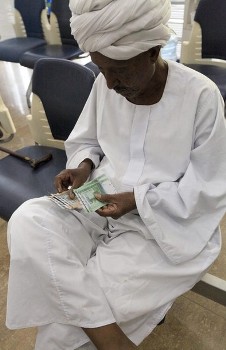Sudanese president urges labor union to agree on removing subsidies on fuel and other goods
March 21, 2012 (KHARTOUM) – The Sudanese president Omer Hassan al-Bashir met today with a delegation from the Sudan Workers Trade Union Federation (SWTUF) and discussed with them ways to improve workers’ conditions amid soaring levels in prices of basic commodities.

But the Sudanese leader warned that raising wages without careful review of its implications could further fuel inflation. He further said that the economic situation may not allow for immediate bump in pay.
Ghandour said the delegation promised to study the offer extended by Bashir before formulating a position. He added that such proposition was rejected by SWTUF before for fear that they would only receive minor increases.
SWTUF head also said that the president promised that presidential decrees will soon be issued to enforce the payment of pension arrears in all states dating back to 2001. He explained that oil revenue split with what is now South Sudan and later its secession prevented disbursement of the funds.
Sudan lost most of its oil reserves when former civil war foe South Sudan became independent in July. The plunge in oil income, the mainstay of state coffers, has sent the Sudanese pound into free fall, driving up the cost of imports.
Several delegations from Sudan toured the Arab Gulf states seeking help amid lack of international venues to obtain credit for Sudan which is under comprehensive economic sanctions imposed by the United States since 1997.
Ghandour said he was optimistic about Bashir’s promises adding that there are further details from the meeting that he chose to withhold.
“The president pointed out the issues and economic measures that we do not want to talk about it in the media…but we are encouraged by it through working according to the curriculum based on Islamic distribution of wealth,” he said.
Sudan parliament rejected a move by the government last December to end fuel subsidies despite official assertions on the need for this.
Last October Sudan central bank governor Mohamed Khair al-Zubeir said that subsidies “are a big burden for the state” particularly for fuel”. He further said that a barrel of fuel was sold locally at $60 compared to a market price of $100.
Many ordinary Sudanese are increasingly complaining that it is becoming more difficult surviving off the income they generate.
(ST)

